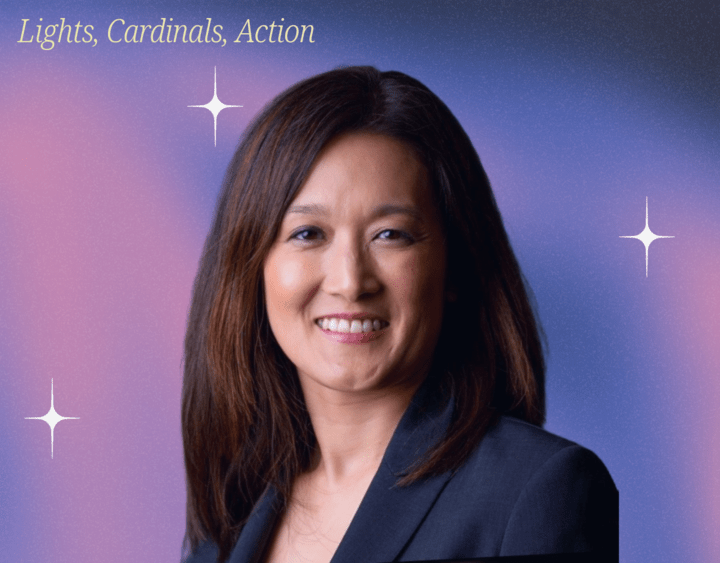Some people fear perilous, unpredictable things — a bear, a tornado or even a career in the arts. Charlotte Koh ’95, now Executive Vice President of Acquisitions and Co-Productions at Lionsgate, fought her fears in order to launch a successful career in entertainment.
Koh worked as a consultant after graduating from Stanford. Then she pivoted her career and enrolled in the Peter Stark Producing Program at USC’s School of Cinematic Arts. She went on to become Senior Vice President of Business Development for Marvel Studios, the founder of Hulu Originals and an Emmy-nominated executive producer before arriving at Lionsgate.
Koh spoke to The Daily about the key to networking success and finding the courage to pursue a creative career.
This interview has been lightly edited and condensed for clarity.
TSD: How did you decide to get an MFA and be a film executive?
CK: I was always interested in theater. I did experimental theater in high school and at Stanford. When I was consulting, one of my clients was MTV Europe, and that was my first exposure to professional executives. I was having a real examination while I was consulting, asking myself, did I want to get an MBA? That’s what everybody was doing.
One of my friends from Stanford told me about a producing-focused MFA program at USC. I decided I would apply, and if I didn’t get in, I could go to Hollywood and be an assistant for a couple of years and see if it works out. I wrote a very specific application essay: I said I’ve always had a passion for theater and performing arts, and I would like to use this degree to pivot into an executive role at a specialty division like Miramax or Searchlight. That’s how I think I got in — because I was very specific about what I wanted.
The Stanford Daily [TSD]: If someone wants to pursue a creative career after college, should they dive into it first, or should they work a few years at a stable job before transitioning into a creative career?
Charlotte Koh [CK]: It’s personal. Your risk tolerance changes depending on your circumstances. I came out of Stanford with student loans, and I was a political science major dithering what to do next. I did what I call productive stalling — consulting. That helped me pay off my student loans and finance my MFA. At the end of the day, though, when you are young and straight out of college, there’s almost no such thing as a risky decision because time is on your side. You can always auto-correct. No harm, no foul, you probably learned a lot about yourself.
TSD: How did you land your first couple roles in the industry?
CK: My MFA program was well-connected and placed me in an internship at Searchlight back in 2001. I stayed in that job for six years, and I got promoted from intern to assistant to executive. I was just lucky I had that opportunity.
TSD: What advice do you have for forming relationships with people who could help your career?
CK: Put yourself out there and don’t take it personally. Someone doesn’t return your email when you invite them to a cup of coffee — it’s fine. At the end of the day, it’s about trust, so you want it to not feel transactional. Show an interest in what the other person is doing, demonstrate you could collaborate with or support them in their work, or introduce them to someone who might be useful to them.
Generally, more experienced people are willing to help, but the more specific [with] what you ask, the better. My nightmare is when people say, “I want to talk to you for 10 minutes,” without having a specific reason or something I could help them with. Those are the requests that get ignored the most. Your intention and your specificity make people turn towards you.
TSD: How do you decide what kinds of risks you want to take and how to go about doing it?
CK: I had this amazing TA at Stanford who said to me, “So many Stanford students simply go from undergrad to grad school, med school, law school. For kids who are supposed to be the best and the brightest, I don’t understand why you guys don’t take more risks. You can withstand a failure or two better than most. The odds are lower that you’re going to fail, anyway.” That was an aha moment for me.
TSD: How do you get over the fear of not knowing what will happen in your career?
CK: You can de-program it. And it’s okay to be scared. But you can’t let the fear center of your brain make your decisions. Brain science shows that fear comes from the amygdala, and once your fight or flight system is stimulated, your prefrontal cortex — where all your executive function resides — shuts down. You have to figure out how to manage the fear. Then you can see more clearly and not hear all the other loud voices of — in my case — parents, friends, peers, the way I grew up. You need those voices to quiet down, so you can hear your own voice about what you really want.
It’s good to pause before making a decision and ask, “What have I got to lose? What’s the worst case scenario?” I took on student debt again to get my MFA, and I knew this was an uncertain proposition. I said, “I’m not going to second guess my decision every 6 months. I’m going to give myself five years, and by the time I’m around 30 or 31, we’ll see where we are.” You have to change your mindset to be like, I won’t know I’m wrong until I give it time.
